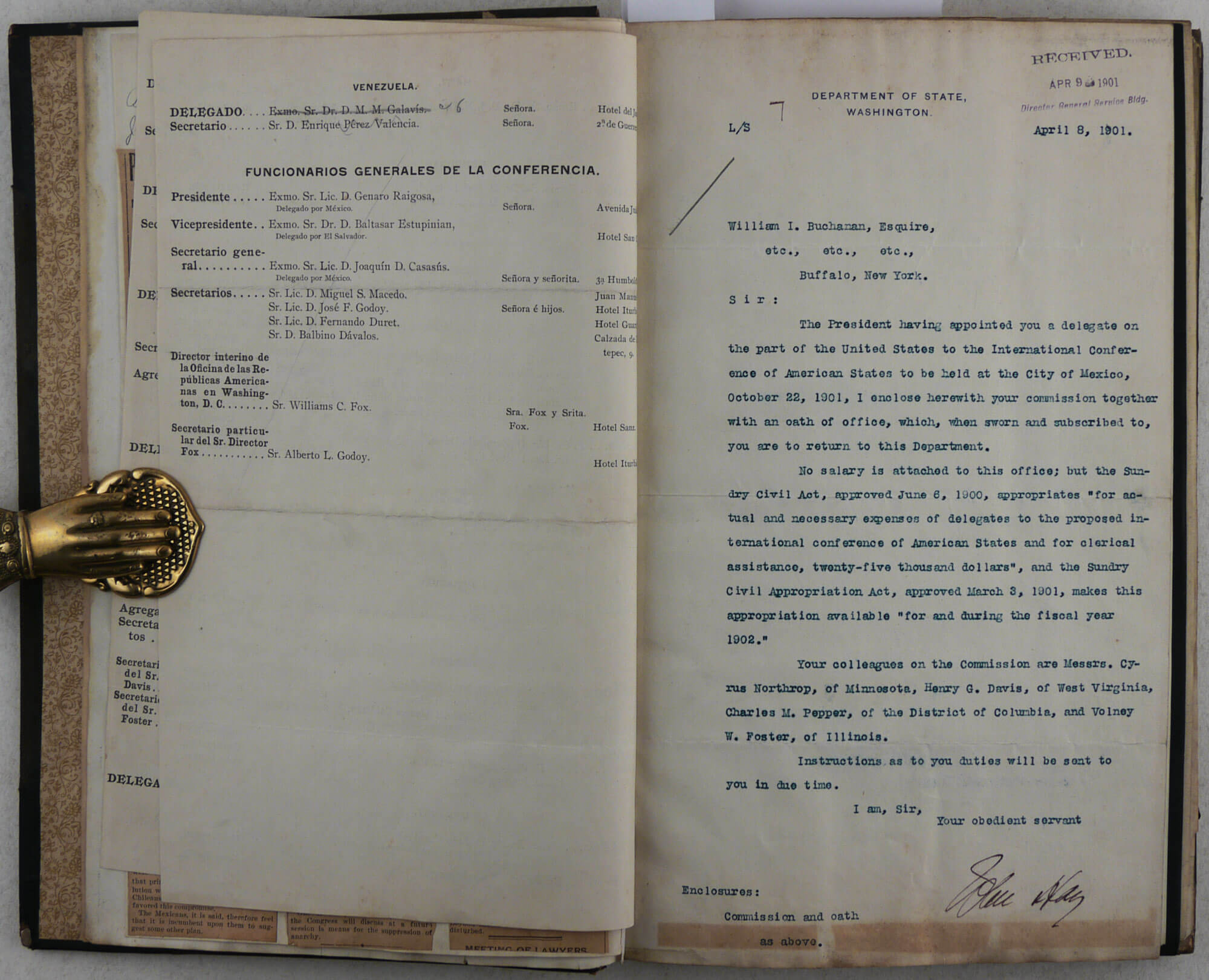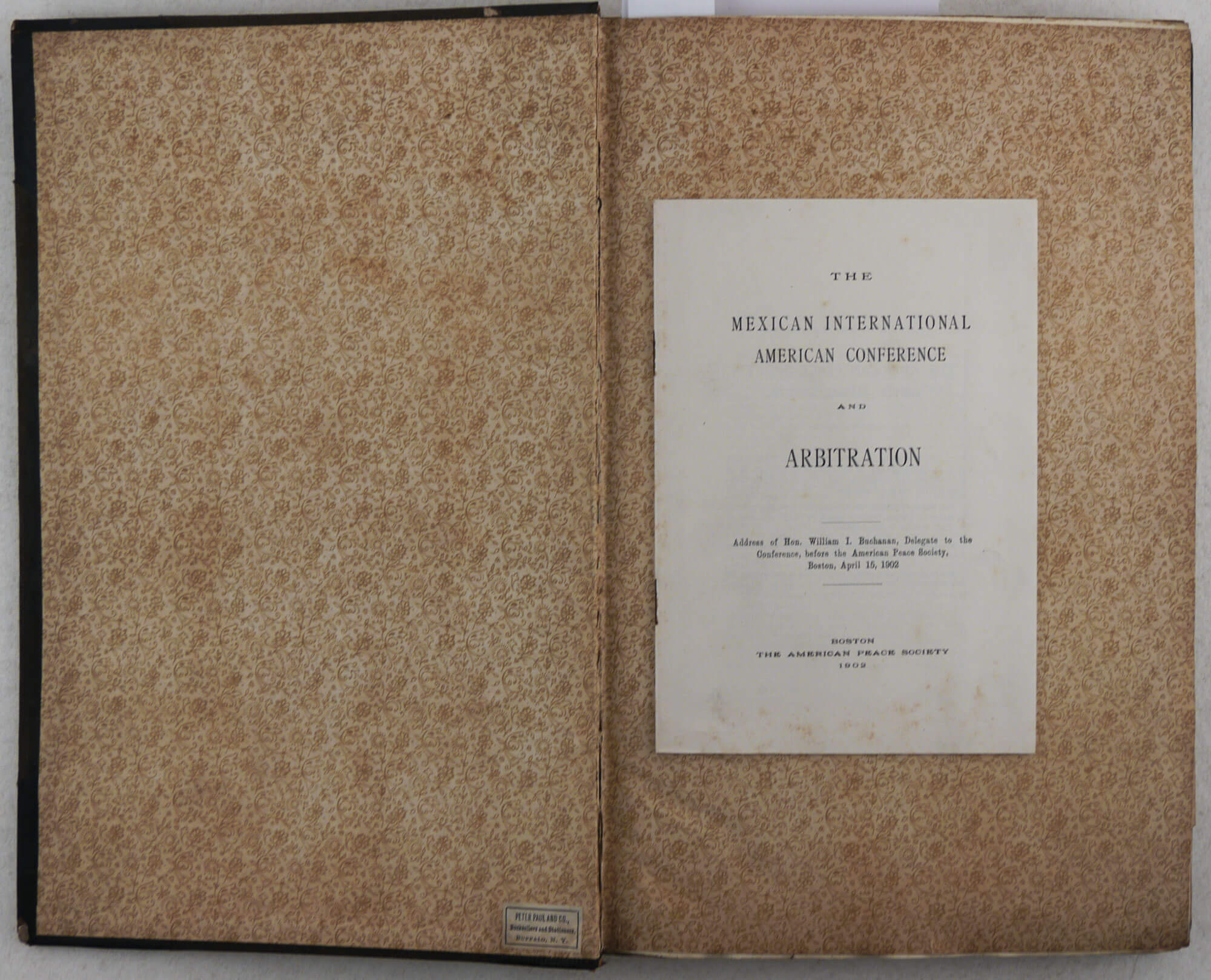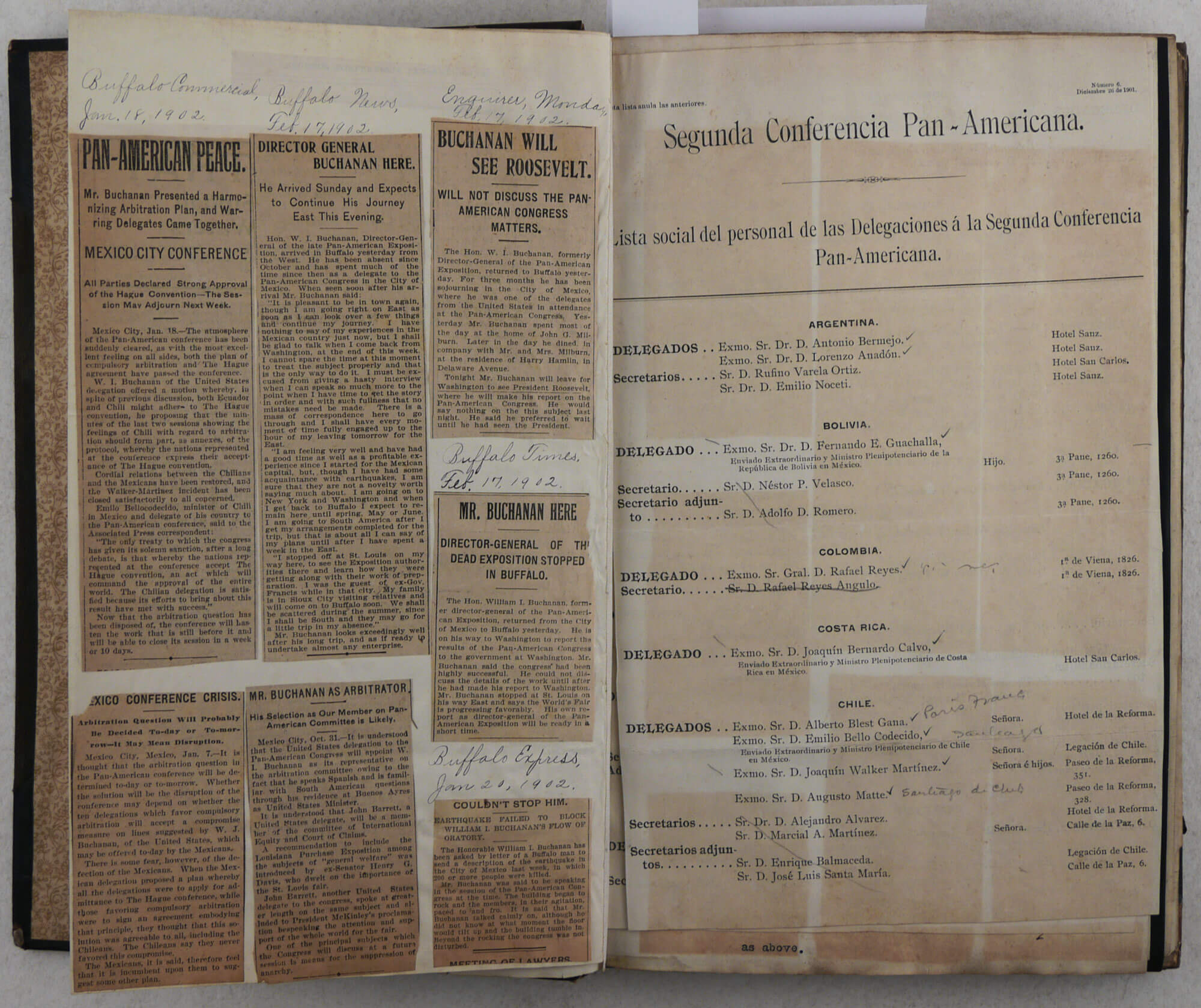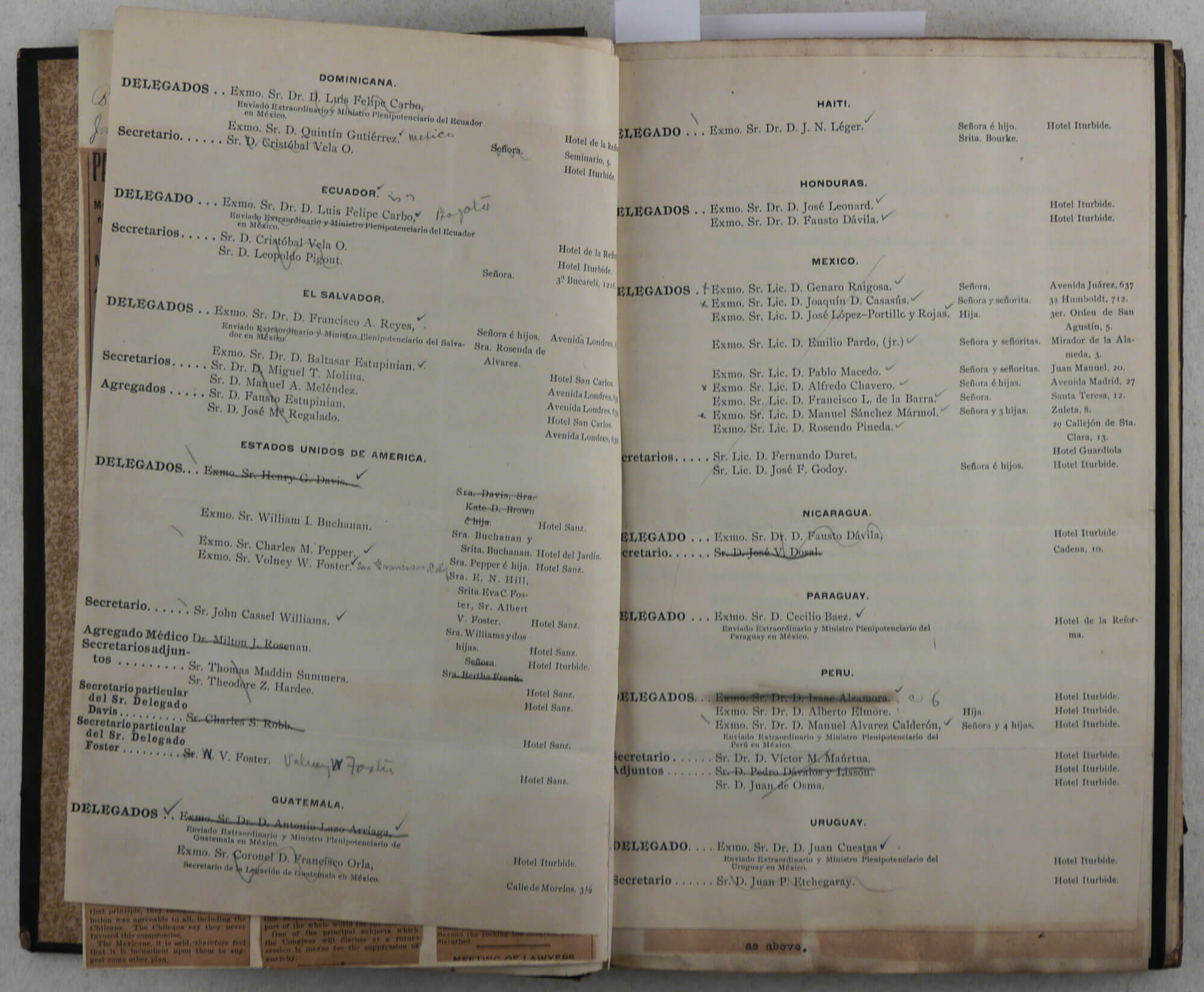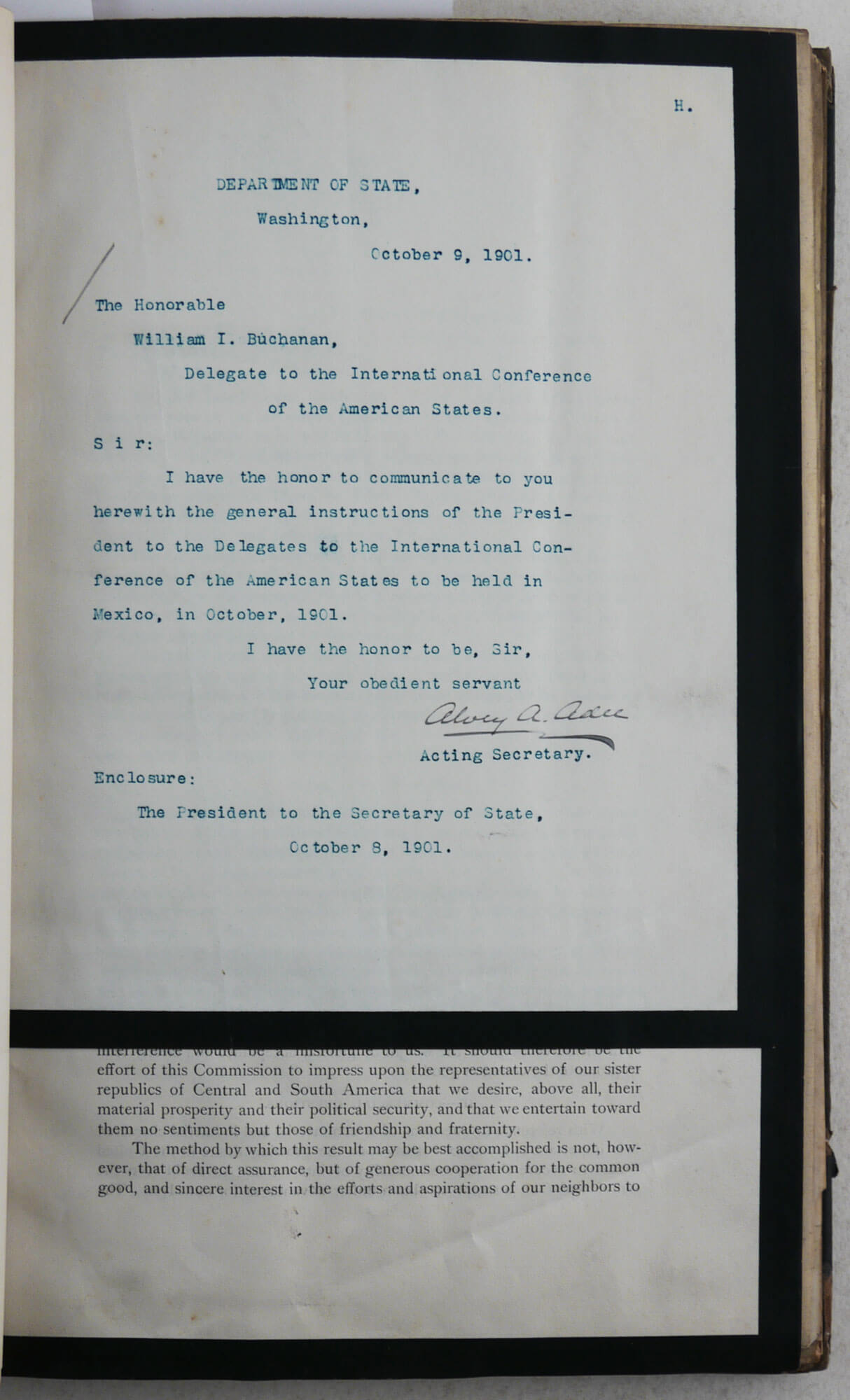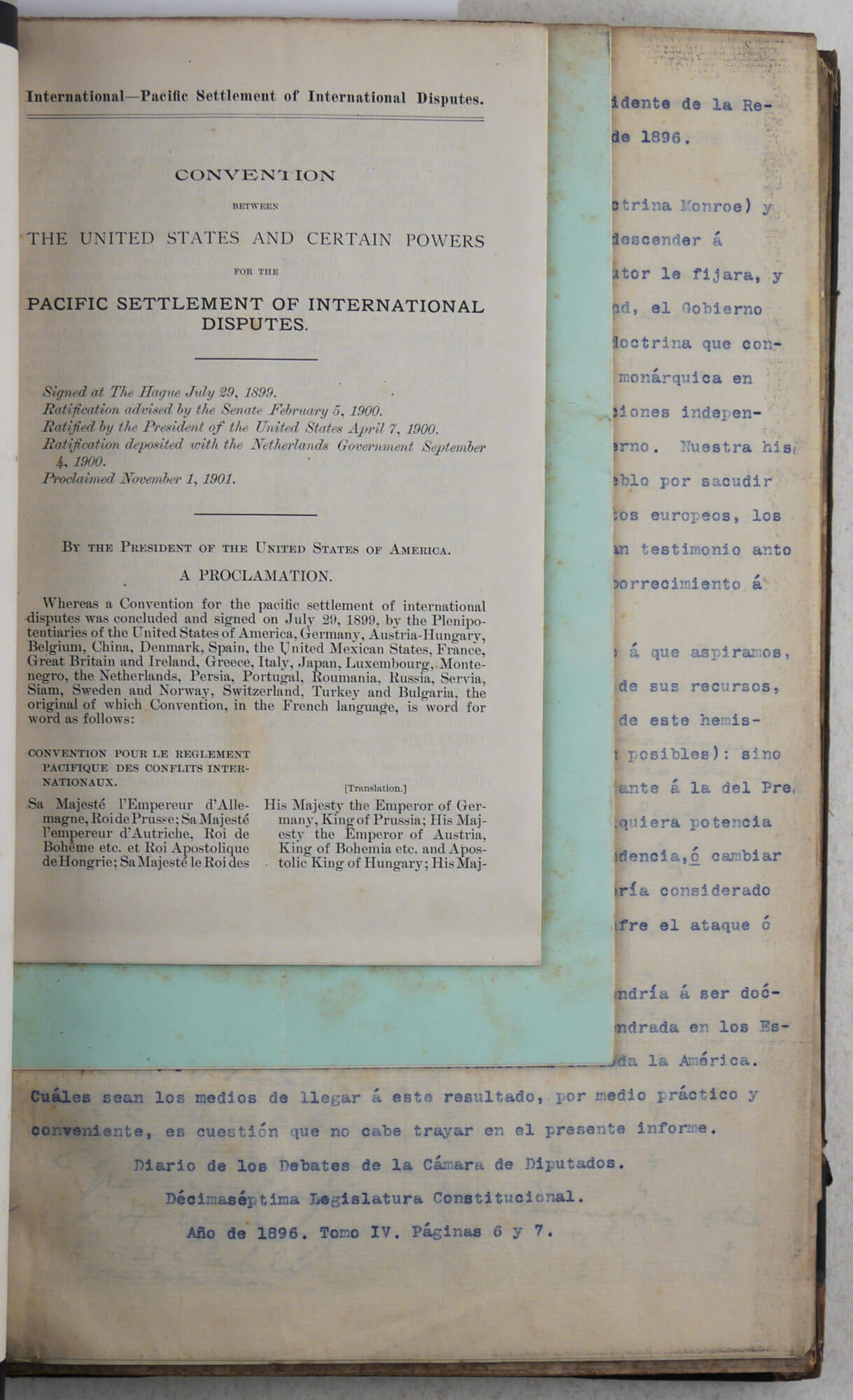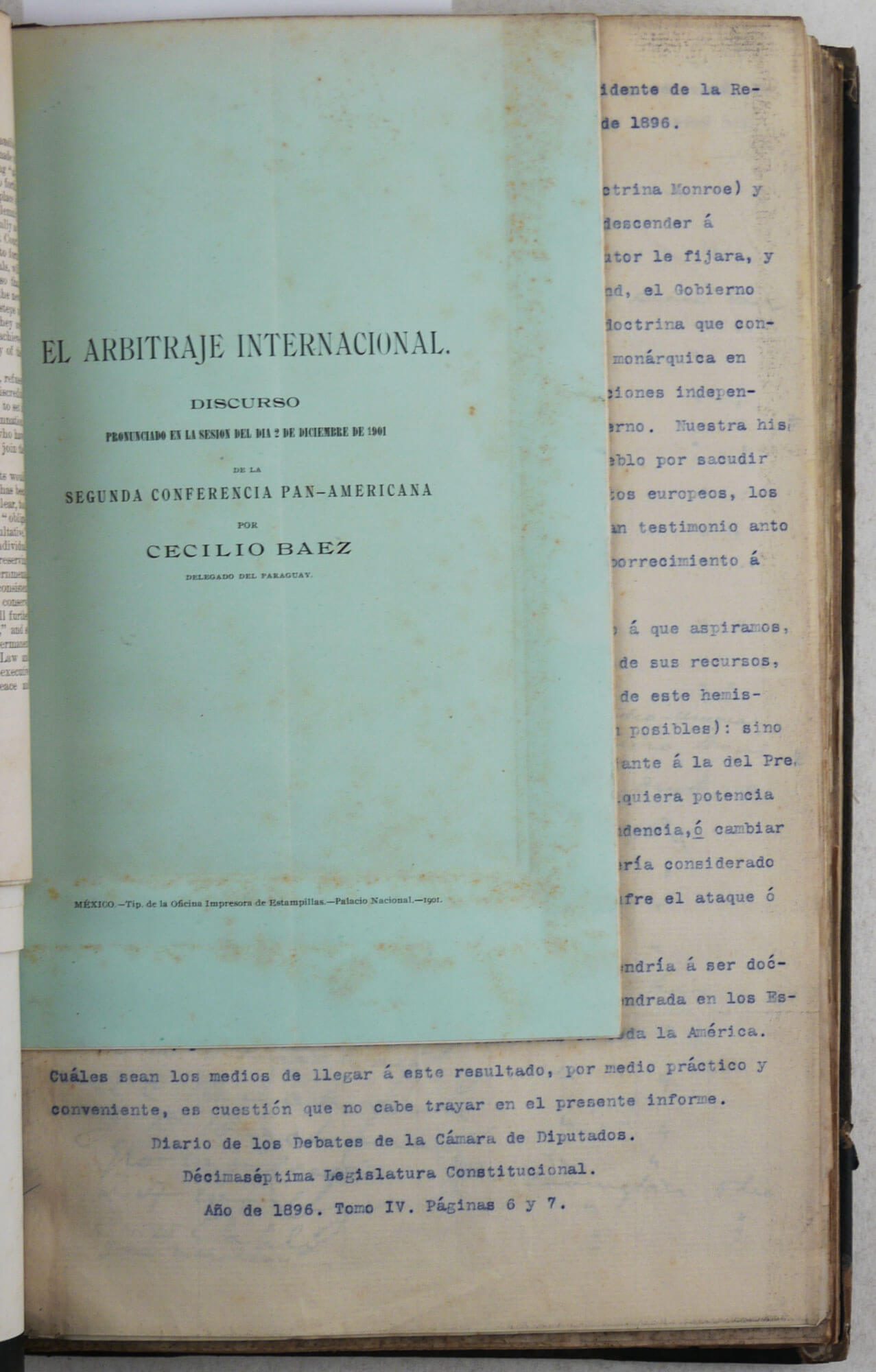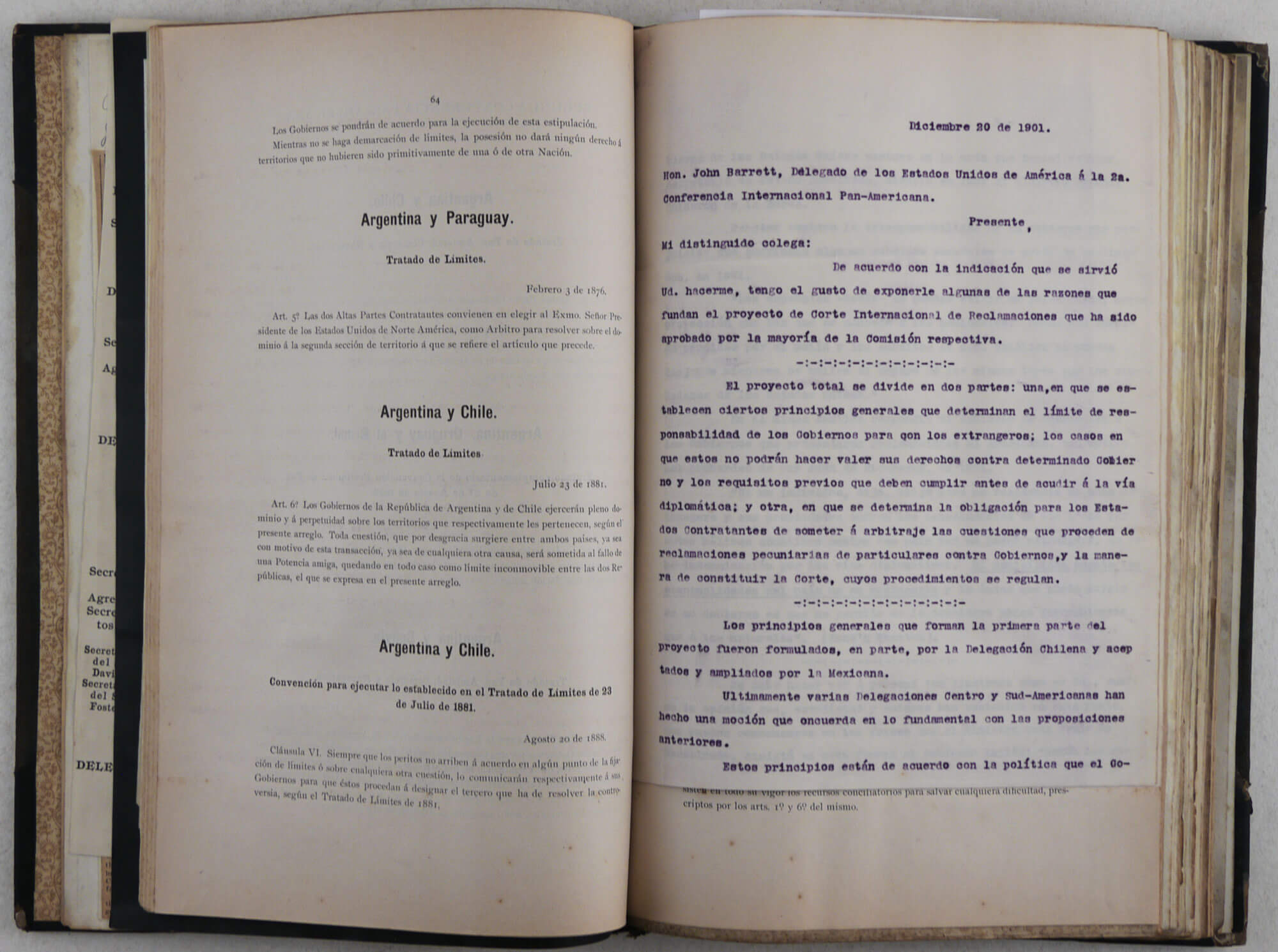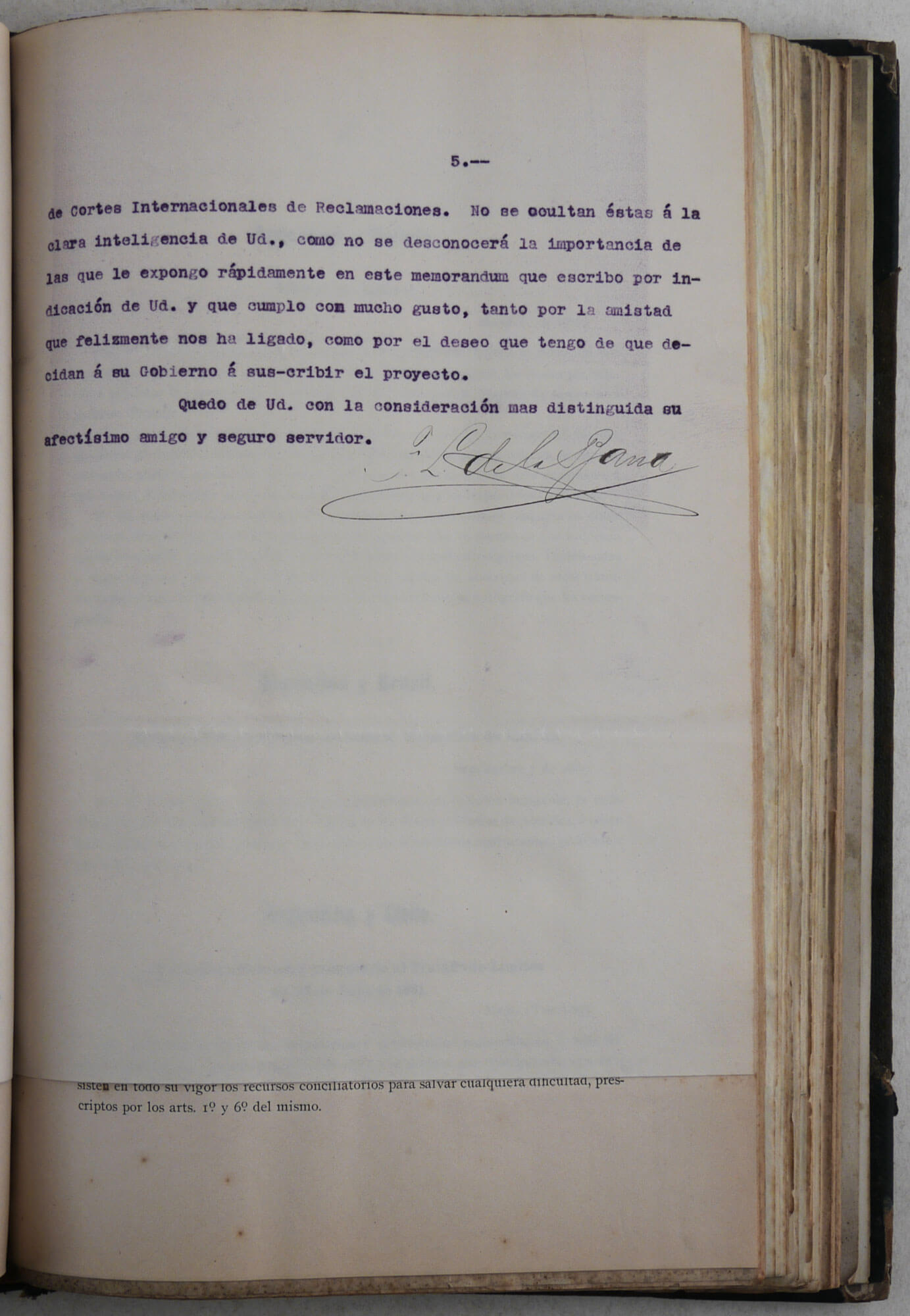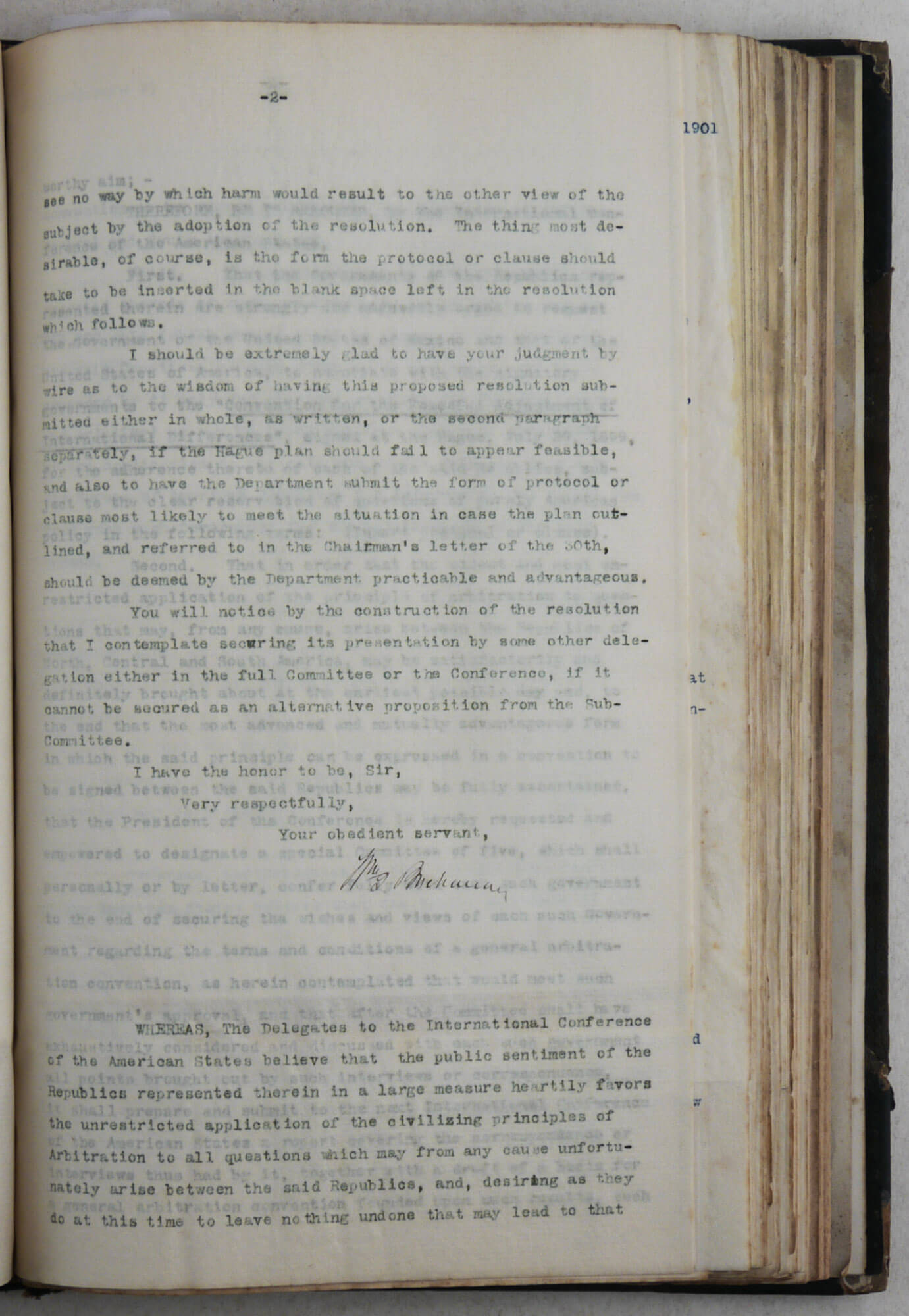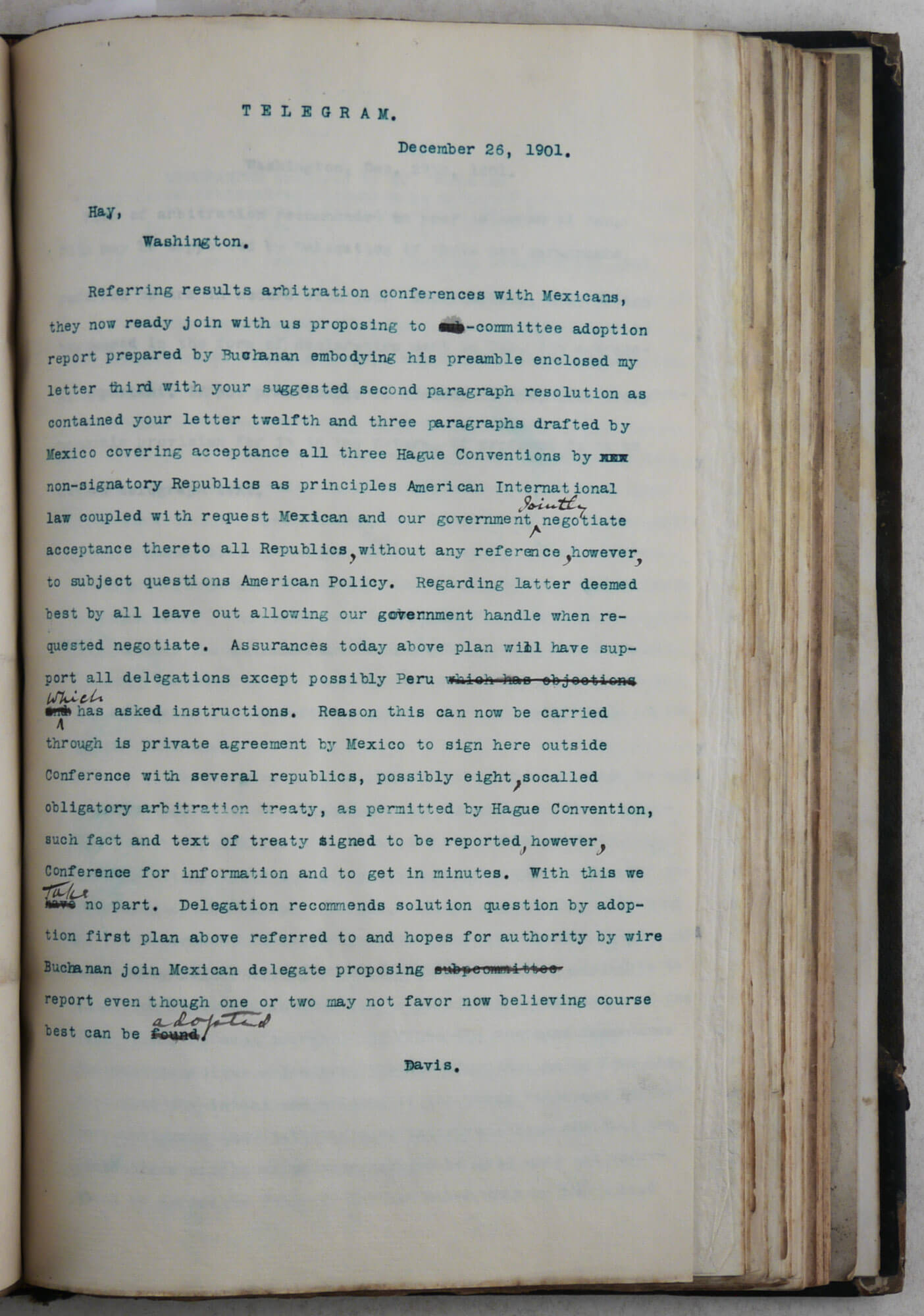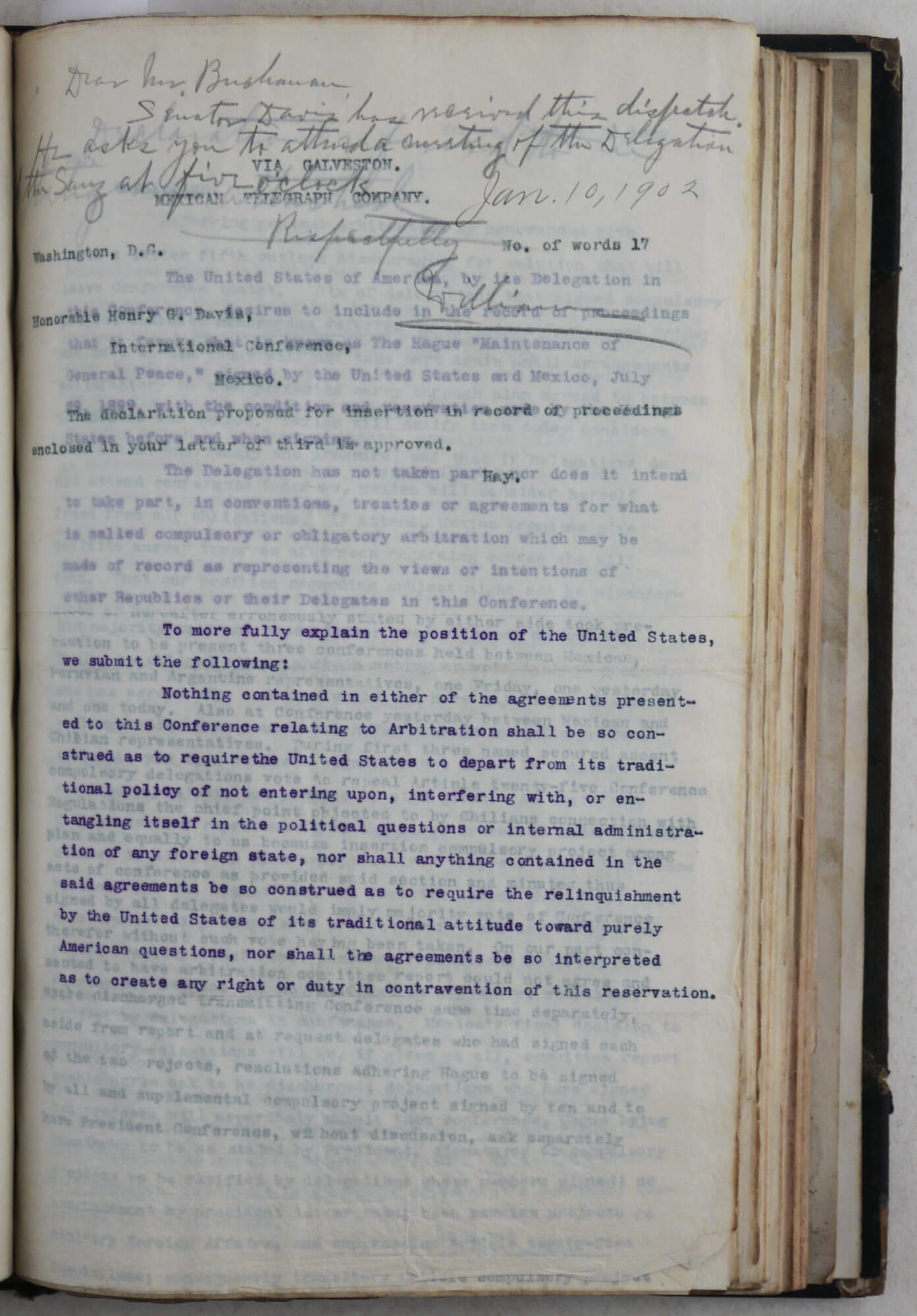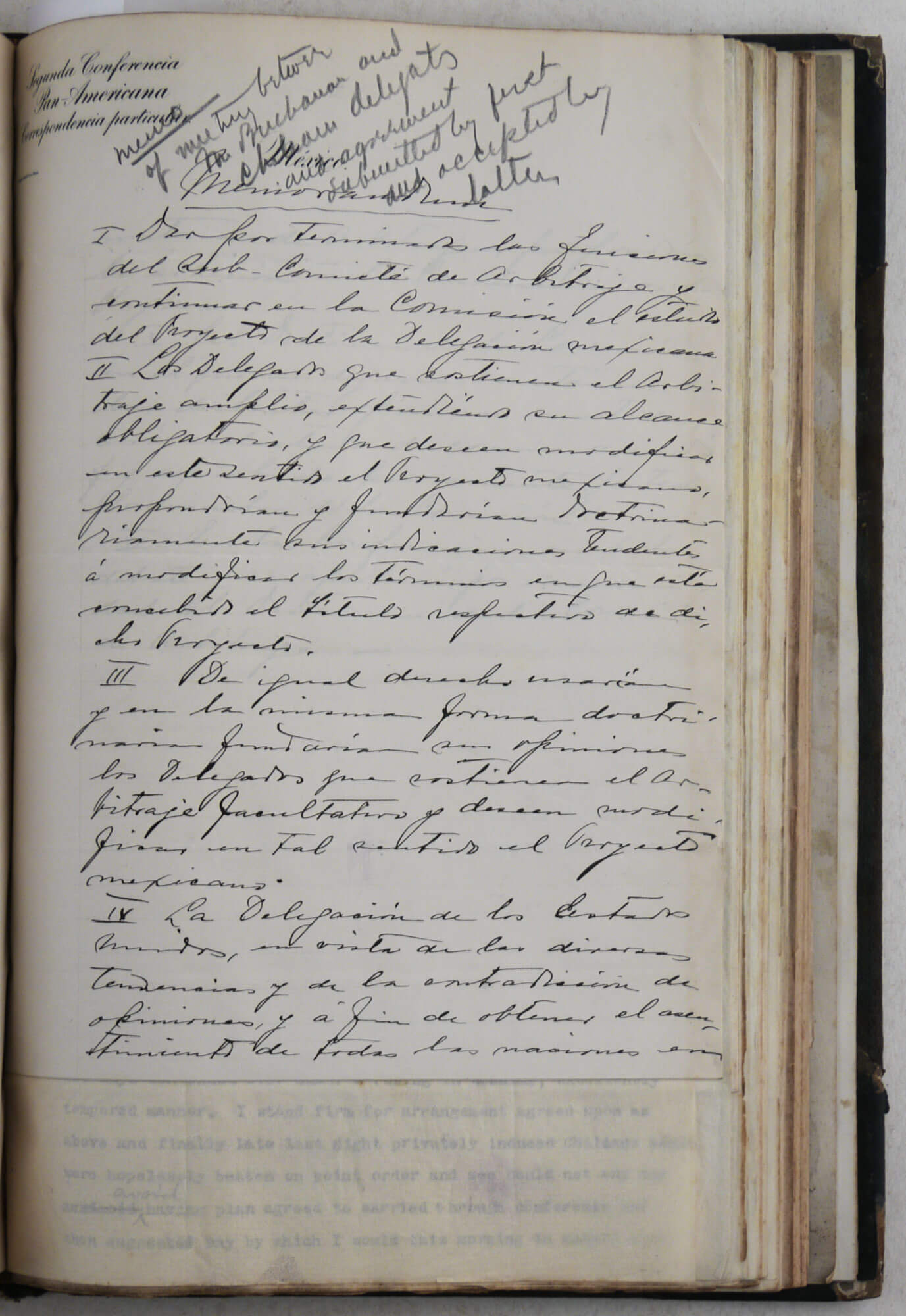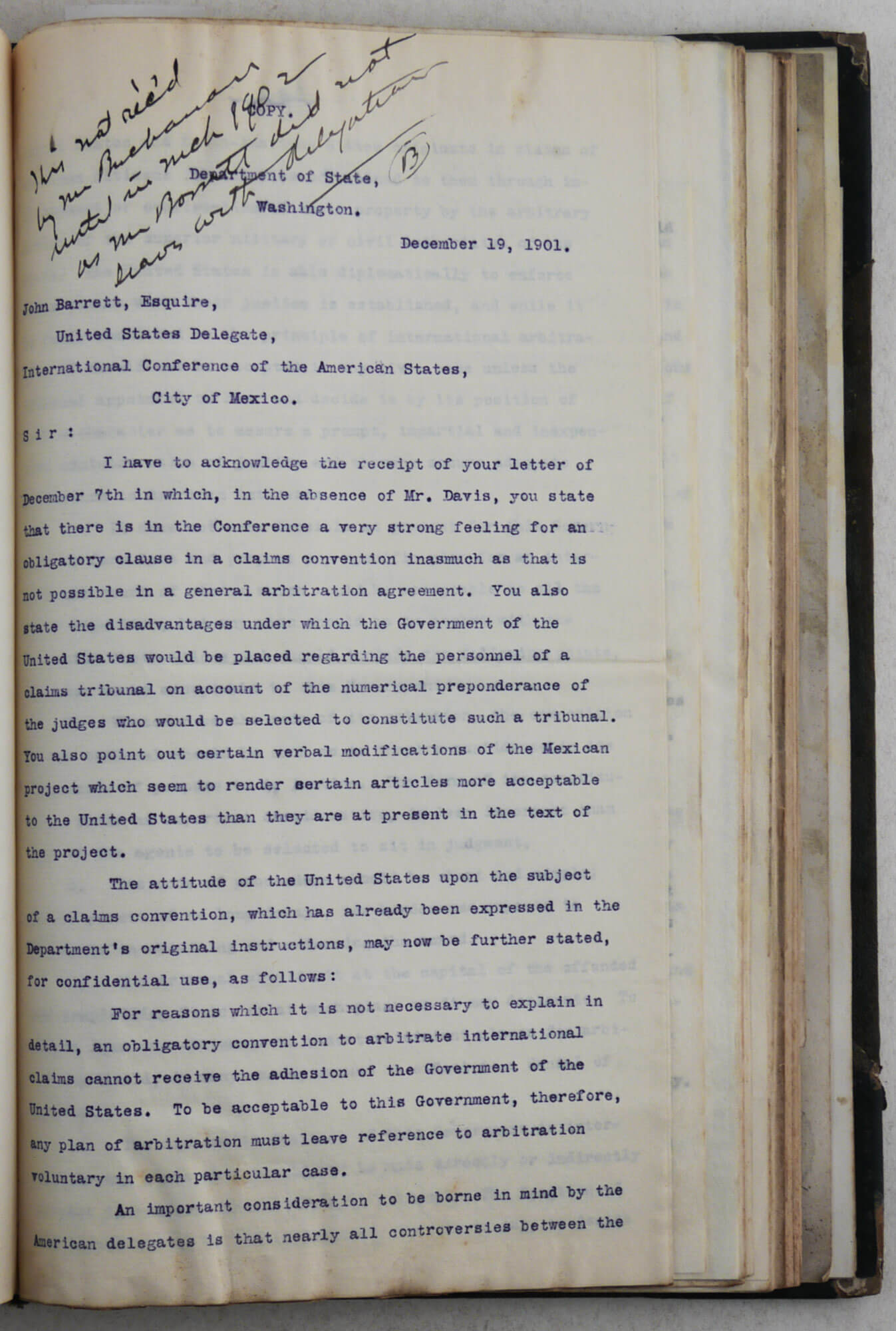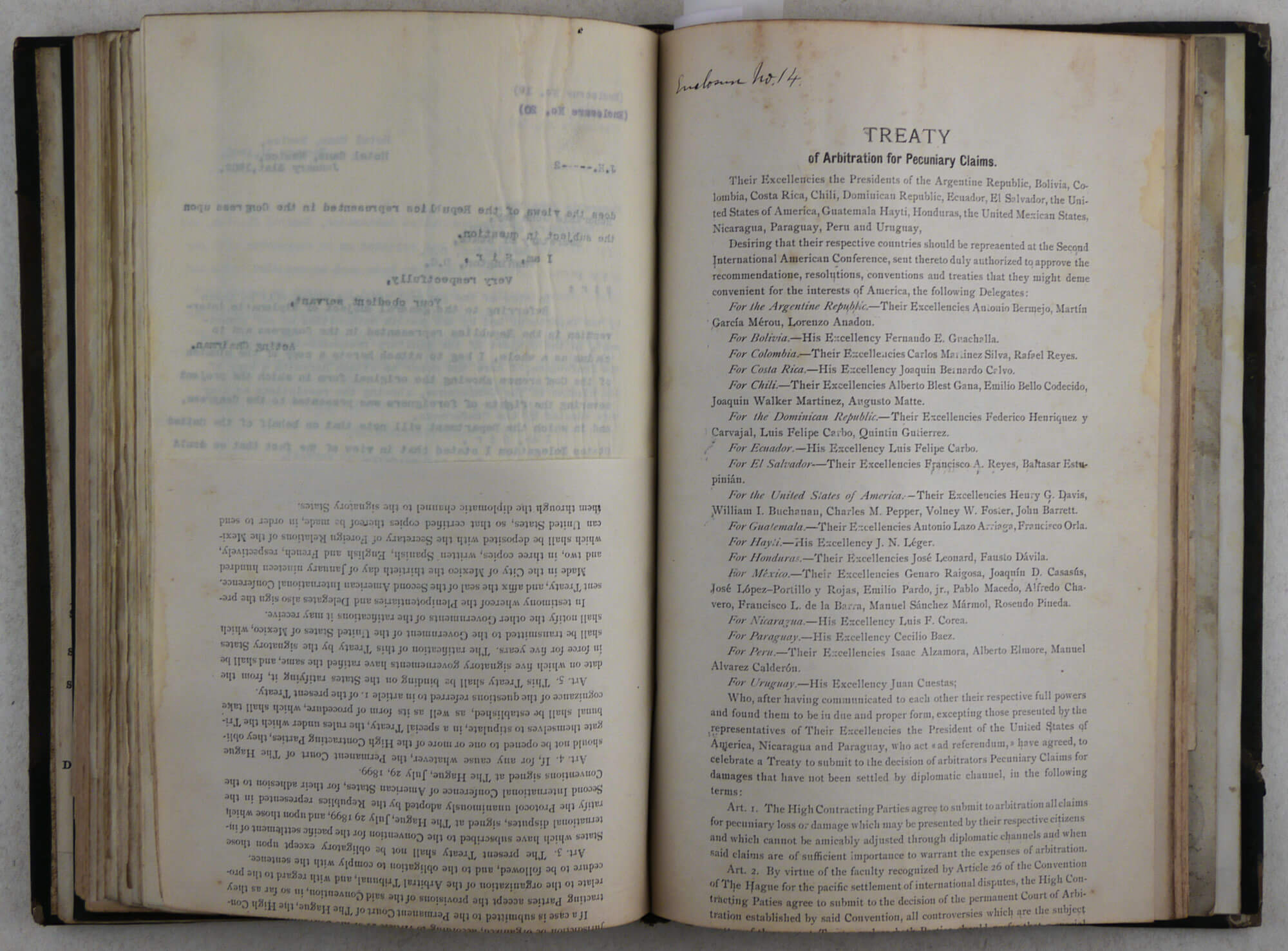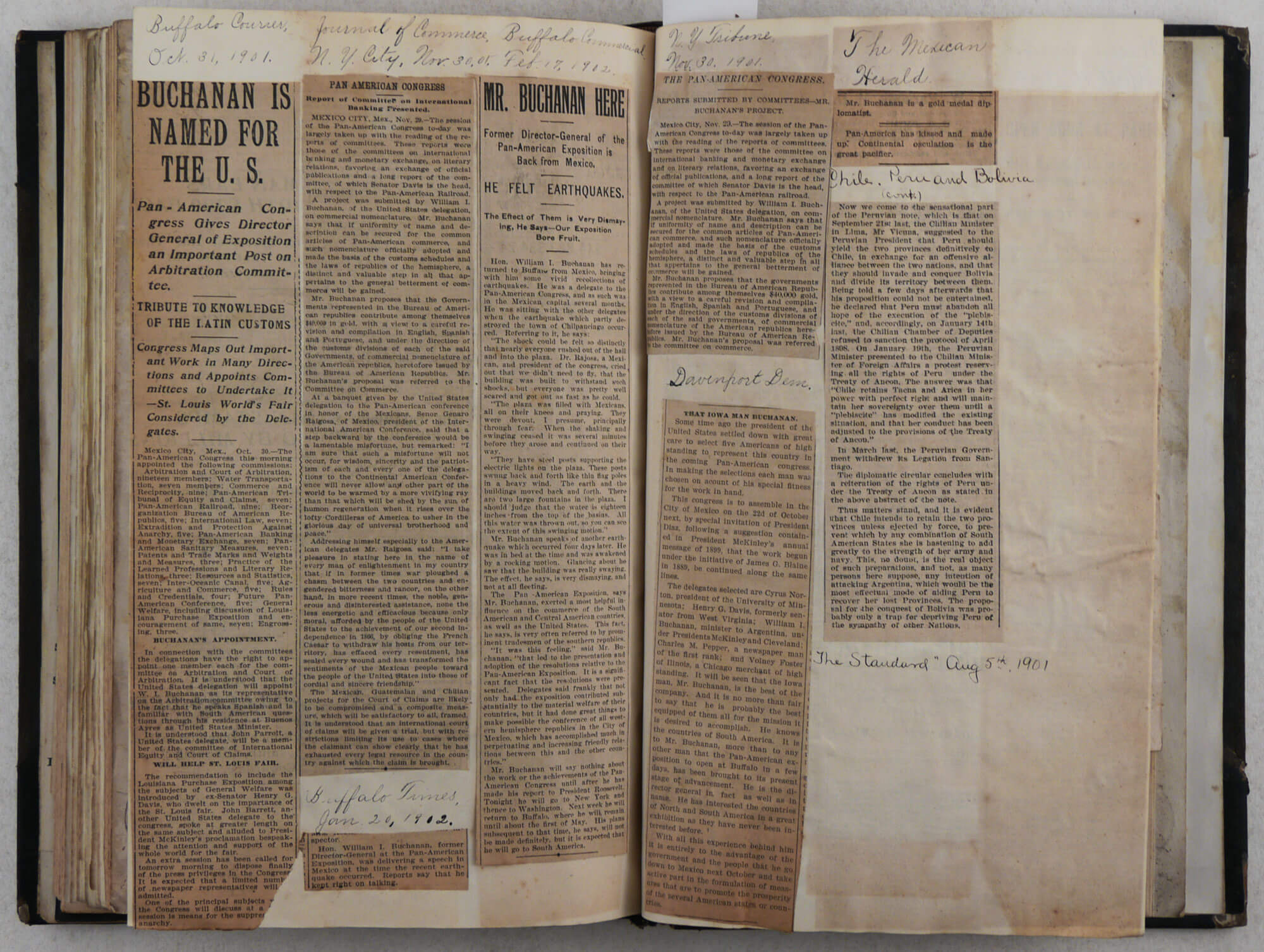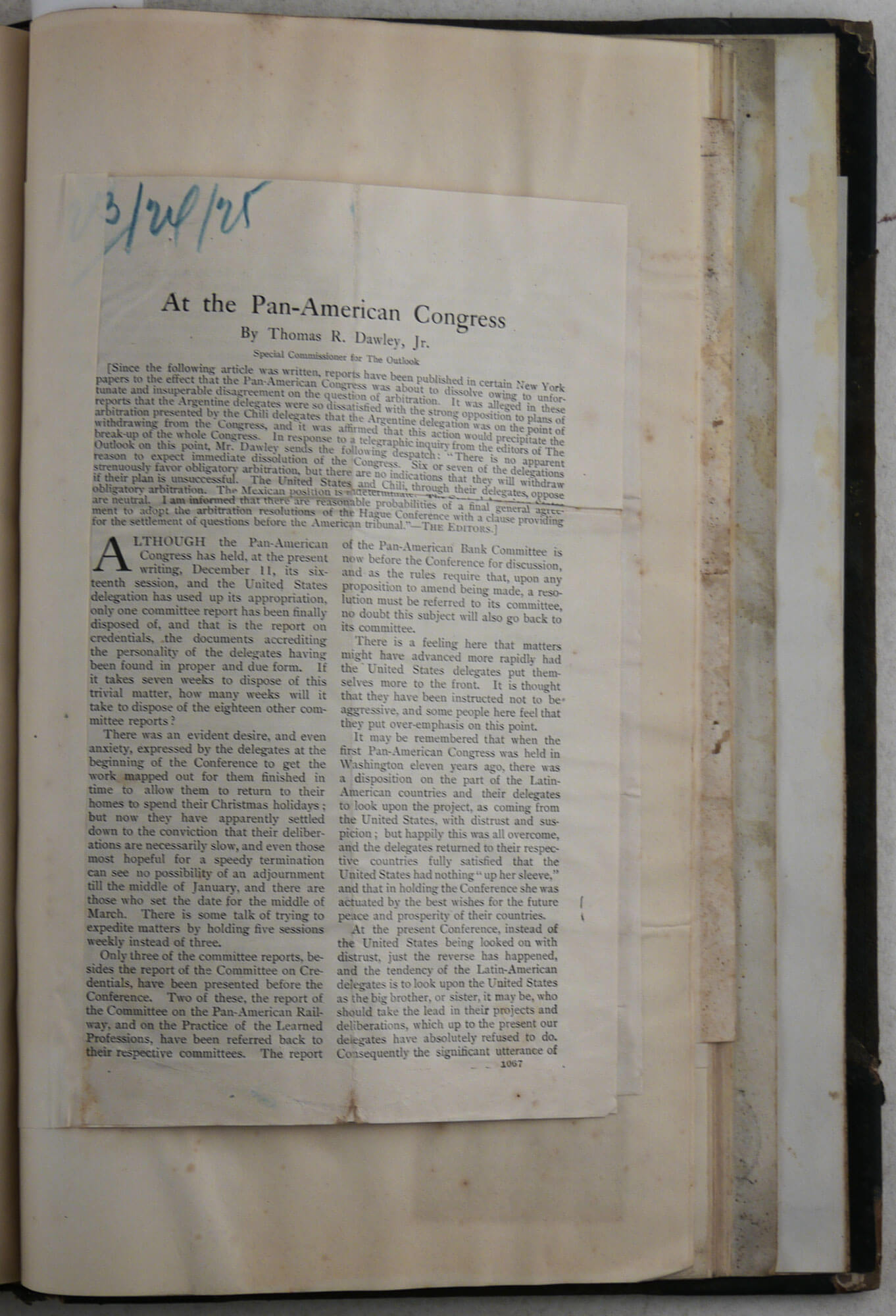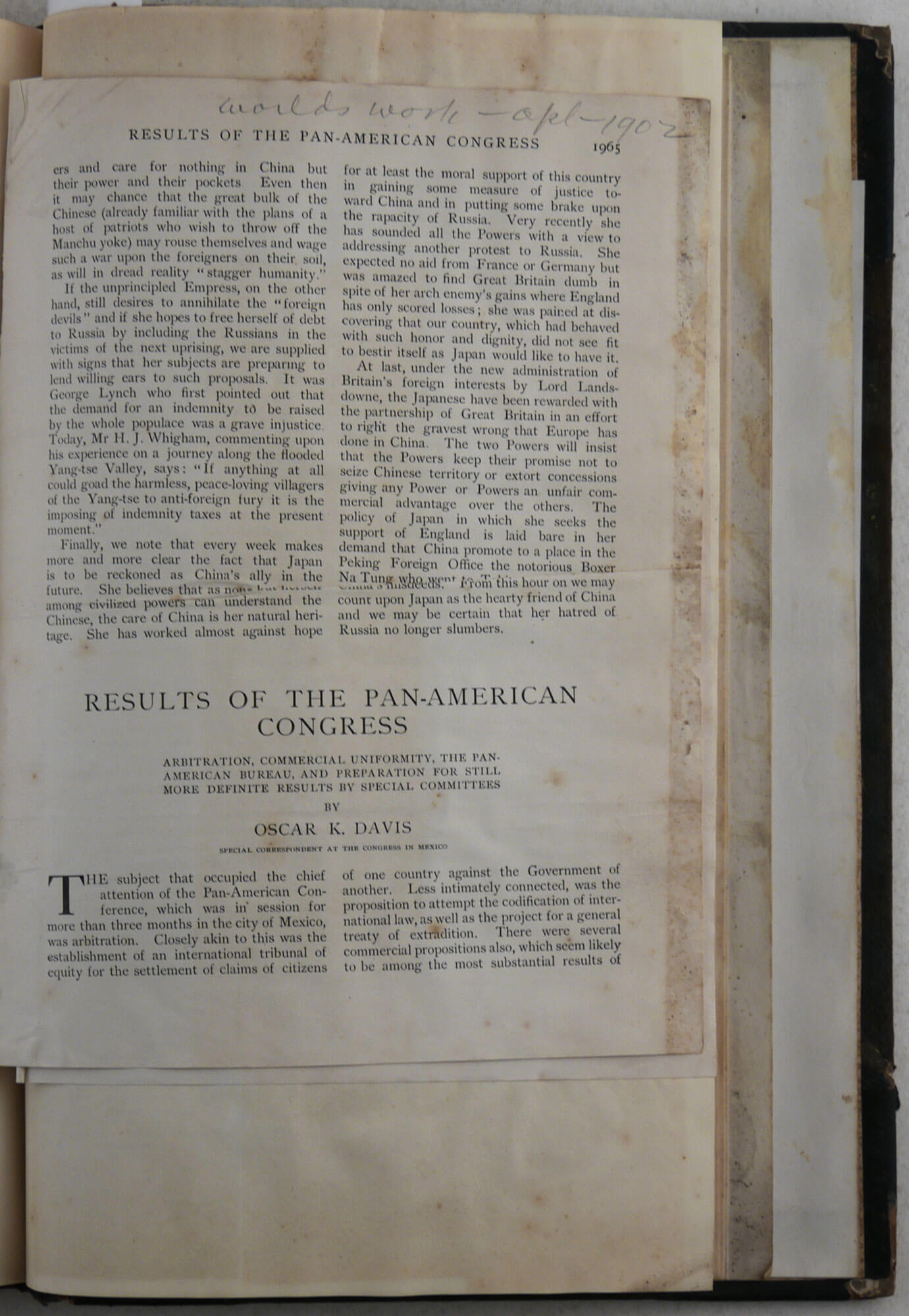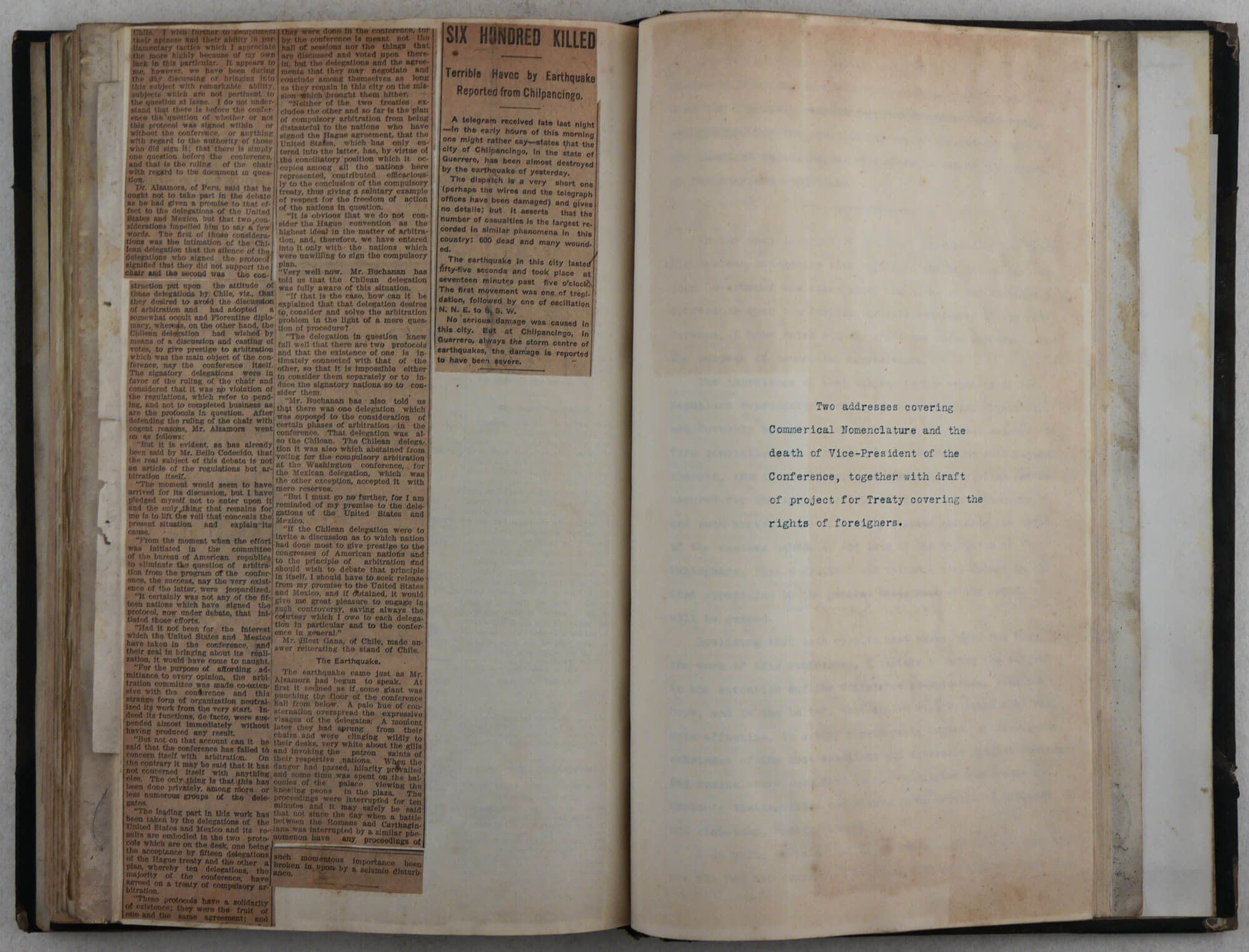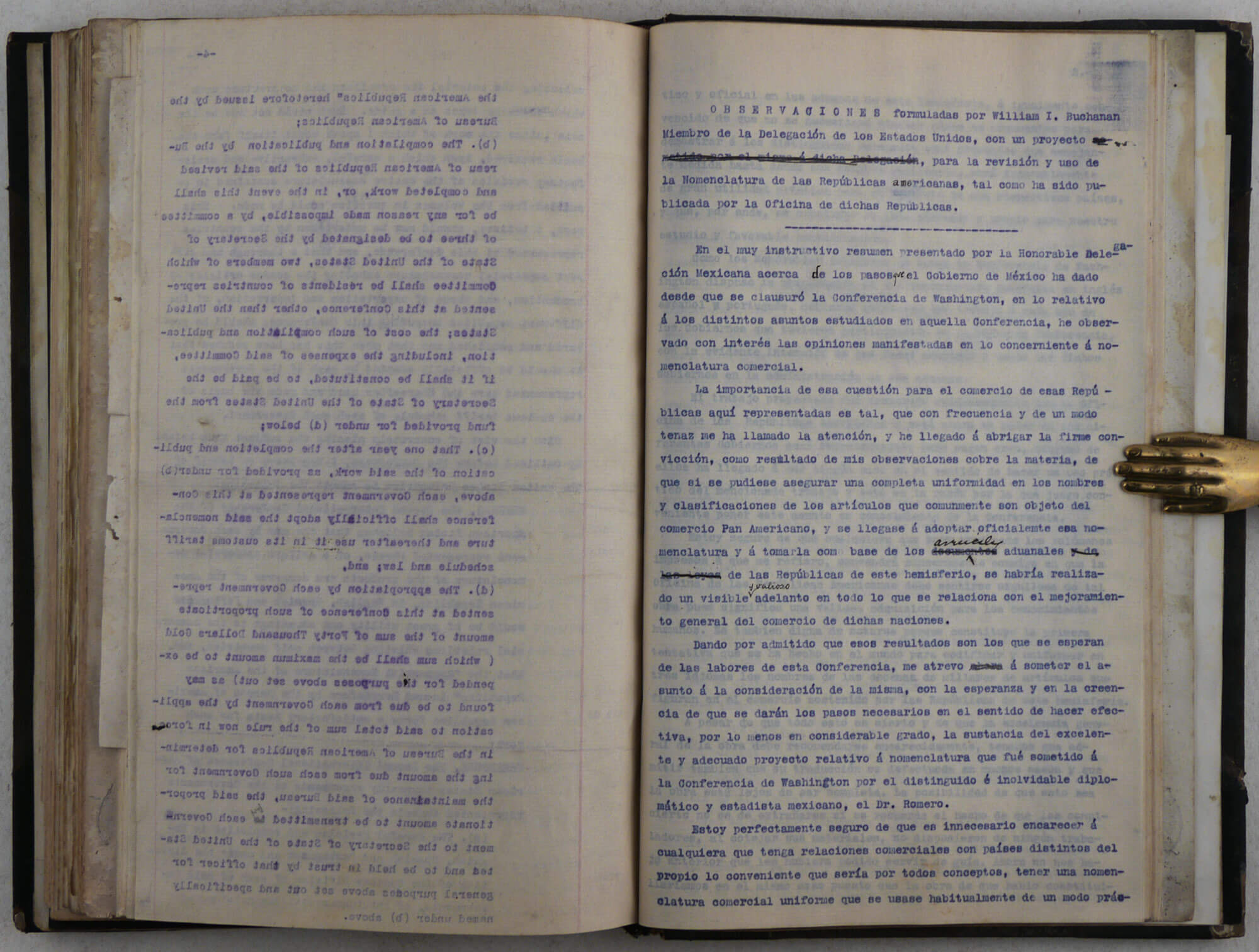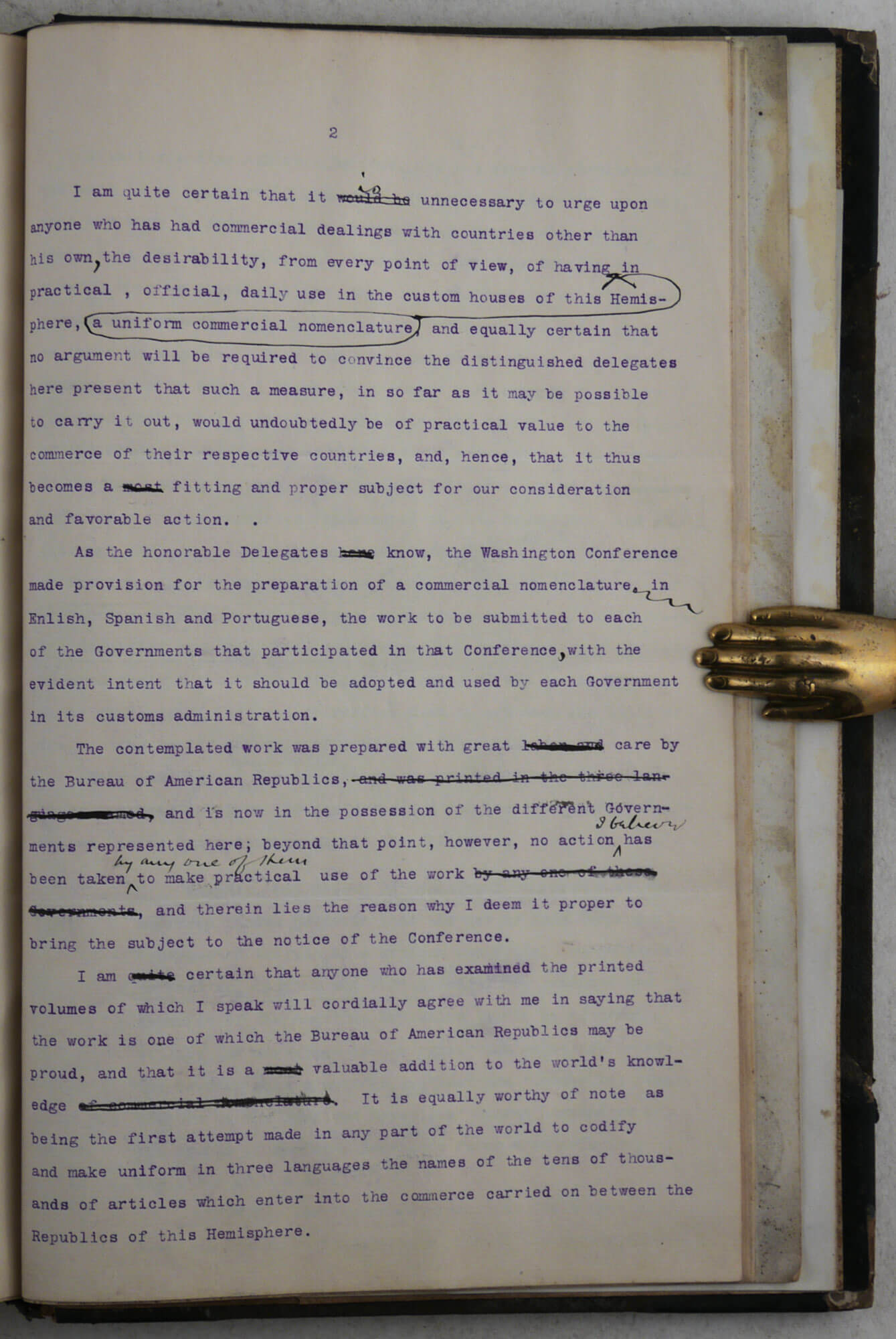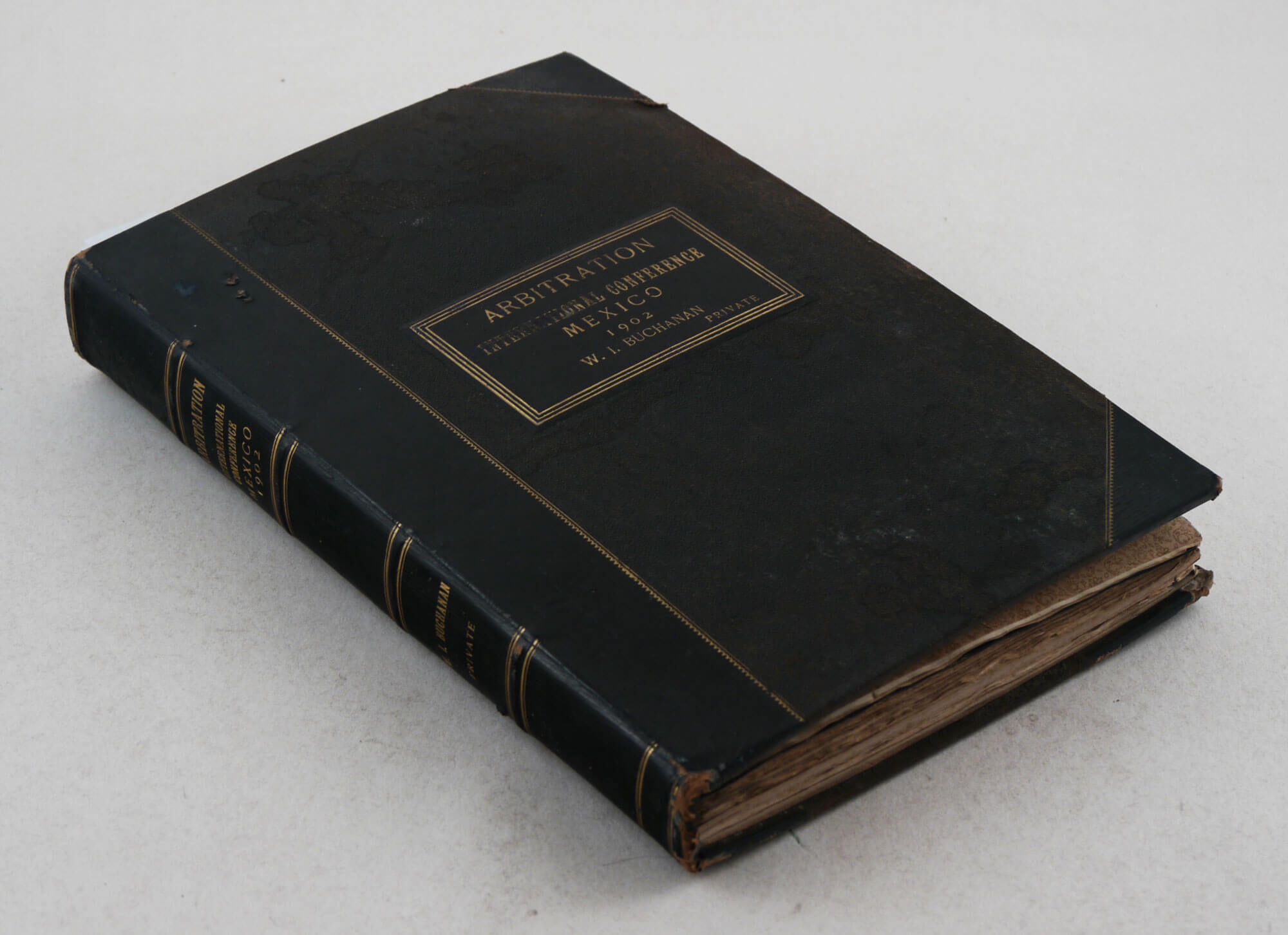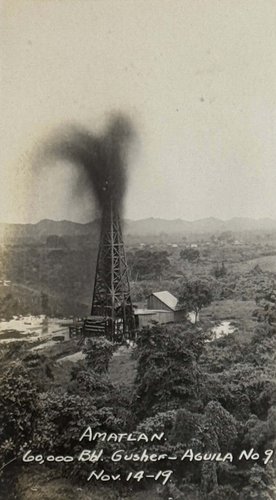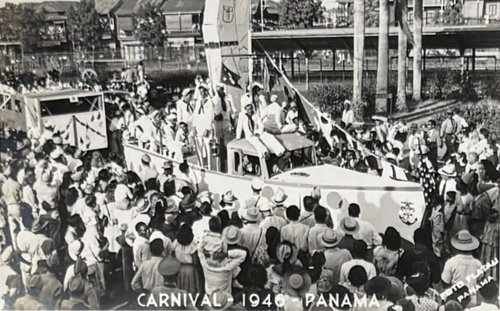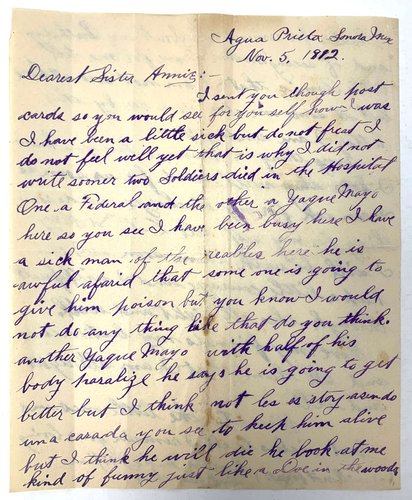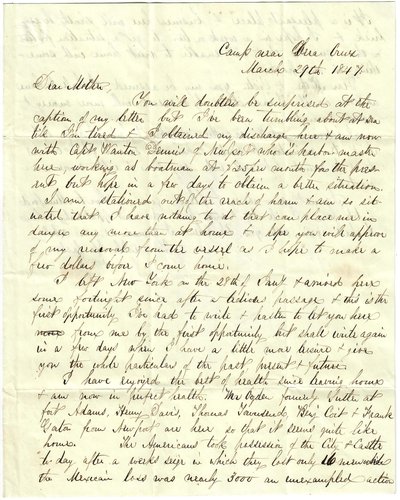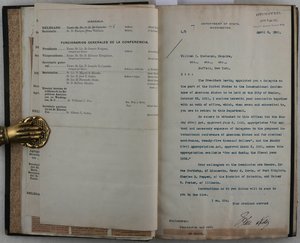
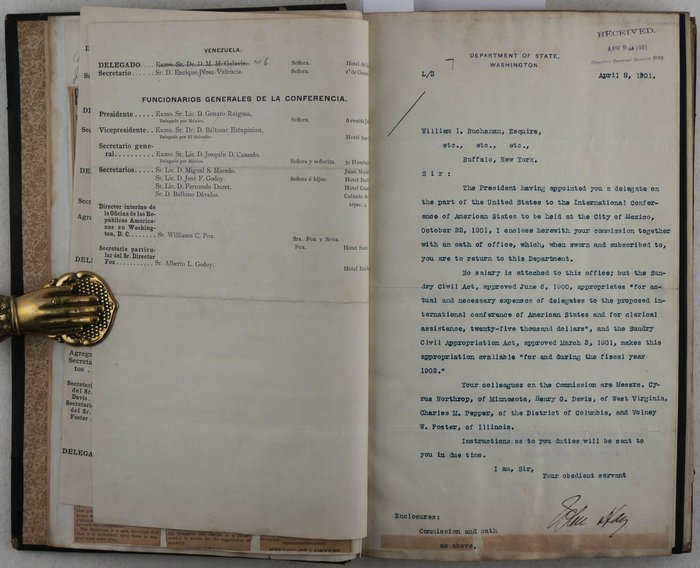





















#MC74
Ca. April 1901 – February 1902
Folio journal/scrapbook (ca. 34x22 cm or 13 ½ x 8 ½ in). With over a hundred bound-in typewritten, manuscript and printed official documents in English and Spanish; in all over 240 pp. Several documents with Buchanan’s period pencil and ink notes and corrections in text. One document was signed by the U.S. Secretary of State, John Hay; one – by Acting Secretary of State Alvey A. Adee; one – by a Mexican delegate, Francisco L. de la Barra; one - by the Secretary of the American Peace Society, Benjamin F. Trueblood. With eight bound-in and one loosely inserted printed brochure or extensive printed documents (see the list below); in all over 280 pp. With ca. fifty mounted or loosely inserted period American and Mexican newspaper clippings. With three loosely inserted official envelopes and a paper leaf with the official letterhead of the Conference (“Segunda Conferencia Pan Americana, Mexico” or “International Conference of the American States. Office of the Delegation of the United States”).
Period black half morocco with cloth boards; gilt-lettered title on the front board and the spine; decorative endpapers; binder’s paper label on the front pastedown endpaper (“Peter Paul & Co., Booksellers and Stationers, Buffalo, N.Y.”). Binding slightly rubbed and soiled, several documents slightly age-toned, but overall a very good journal/scrapbook.
Historically significant private archive of William I. Buchanan, a U.S. diplomat who specialized in South America, documenting his role in the adoption by Latin American countries of the Hague Peace Convention of 1899 during the Second Panamerican Conference in Mexico City (October 22, 1901 – January 31, 1902). The Conference included nineteen delegations from all states of Latin and Central America, as well as the United States. One of the main subjects of discussion was international arbitration, and resolving the issue was difficult as, at the time, “various Latin American countries [had] nearly all of them boundary or other disputes pending, and some of them [were] practically at war” (Noel, J.V. United America: Exactly what was accomplished by the recent congress of powers of the Western Hemisphere// The New York Times. March 2, 1902, p. 10). The most acute disputes involved Chile and Peru (over the provinces of Tacna and Arica) and Venezuela and Colombia (border clashes in the course of the Thousand Days’ War).
“During the trying days when it was thought that at any moment the congress would breakup by the withdrawal of either Chile or the combined forces of Peru, Bolivia, Argentina, Paraguay, and Santo Domingo, one of the men upon whose shoulders fell a great share of the responsibility, and who deserved a great deal of the credit for the solution of the arbitration matter, was the Hon. W.I. Buchanan, United States delegate, and a member of the sub-committee on Arbitration. Mr. Buchanan, who was United States Minister to the Argentine Republic and recently Director General of the Pan-American Exposition, by his knowledge of Spanish and practical diplomatic experience in Latin America, was able to mend the broken threads and secure harmony when it seemed impossible of accomplishment” (Noel, J.V. Ibid.).
After tense negotiations, it was resolved that all South American countries accepted the “Convention for the Pacific Settlement of International Disputes,” signed during the First Hague Peace Conference on July 29, 1899. Buchanan received gratitude from the U.S. Secretary of State John Hay (in office: 1898-1905) and was appointed the leader of the U.S. delegation for the Third Panamerican Conference in Rio de Janeiro (July 23 - August 27, 1906). The conferences led to the formation of the “International Union of American Republics,” or the “Pan American Union,” officially reorganized as the Organization of American States in 1948.
The journal/scrapbook comprises Buchanan’s private archive documenting his work at the Second Panamerican Conference. The materials are organized into four sections, with the following typewritten half-titles:
- Correspondence exchanged between the Department of State and Mr. Buchanan in connection with the subject of Arbitration at the International Conference of the American States held at Mexico City, 1901-1902, with drafts made by Mr. Buchanan of the project as finally passed and other private data and paper relative thereto;
- Mr. Buchanan’s correspondence with the State Department and his private memoranda and copy covering Treaty introduced by Mr. Buchanan and signed at the Mexican Conference by nineteen countries, covering arbitration of claims for pecuniary damages;
- Newspaper clippings regarding Arbitration at the Mexican Conference;
- Two addresses covering Commercial Nomenclature and the death of Vice-President of the Conference, together with draft of project for Treaty covering the rights of foreigners.
The documents include an official list of delegations and their members (with Buchanan’s pencil notes); a letter of Buchanan’s appointment to the U.S. delegation signed by the Secretary of State John Hay; instructions to Buchanan from President Theodore Roosevelt with the cover letter signed by the Acting Secretary Alvey A. Adee; projects of a treaty of international arbitration presented by the Mexican delegation; typewritten copies of correspondence (letters and telegrams) between Buchanan, John Hay, Henry G. Davis (the head of the U.S. delegation) and Powell Clayton (first U.S. ambassador to Mexico; in office: 1897-1905); Buchanan’s memoranda, reports and addresses (several with manuscript notes and correstions in text), a “tentative confidential suggestion;” “The Diaz doctrine as expressed by the President of the Mexican Republic;” a proposition of the Haiti delegation; several versions of the treaty for arbitration and the treaty of arbitration of claims for pecuniary damages; a congratulatory letter signed by B.F. Trueblood (Secretary of the American Peace Society), &c. Over fifty period newspaper clippings include those from “The New York Times,” “Buffalo Courier,” “Journal of Commerce,” “The Mexican Herald,” “The Washington Post,” “Sioux City Tribune,” and others. The last 14-page typewritten document is a draft of a report on the results of the Conference.
The journal/scrapbook also contains eight bound-in and one loosely inserted brochure or printed documents:
1) Convention between the United States and certain powers for the Pacific Settlement of International Disputes. Signed at the Hague July 29, 1899… 27 pp.
2) Pacigerence, a Neutral Alliance for Peacemaking… [4 pp.].
3) DARBY, W.E. “Permanent Arbitration” in Modern International Law: A paper read at the Conference of the International Law Association at Glasgow, 20th August 1901… 2nd ed. London: Peace Society, 1901. 24 pp. Original publisher’s wrappers.
4) DARBY, W.E. Retrogression: or the Proposal to form new treaties of arbitration between the states signatory to the Hague Convention. Presented for the Consideration of the Tenth Universal Peace Congress at Glasgow, September 10th to 13th, 1901. London: Peace Society, 1901. 8 pp.
5) BAEZ, C. El Arbitraje Internacional Dircurso pronunciado en la sesion del dia 2 de Diciembre de 1901 de la Segunda Conferencia Pan-Americana. Mexico: Tip. de la Oficina Impresora de Estampillas, 1901. 13 pp. Original publisher’s wrappers.
6) Algunos datos sobre Tratados de Arbitraje y Buenos Oficios celebrados por las naciones de America/ Segunda Conferencia Pan-Americana. 66 pp.
7) Exposicion de Motivos del Proyecto de Tratado que presenta la delegacion Mexicana sobre mediacion, buenos oficios, comisiones internacionales de investigacion y arbitraje: [in 2 parts]. 11, 20 [=31] pp.
8) Actas y Documentos. Minutes and Documents/ Segunda Conferencia Pan-Americana: Thirtieth Day – Thirty-Fourth Day. 14, 31, 14, 28 [=87] pp.
9) [Loosely inserted:] The Mexican International American Conference and Arbitration: Address of Hon. William I. Buchanan, Delegate to the Conference, before the American Peace Society, Boston, April 15, 1902. Boston: The American Peace Society, 1902. 23 pp. Original publisher’s wrappers.
Overall an important private archive revealing the inside work process on the introduction of international arbitration in Latin American countries during the the Second Panamerican Conference in Mexico City in October 1901 – January 1902.
Having become known for the organization of the Corn Palace Expositions in Sioux City (Iowa) in 1882, Buchanan became a member of the Iowa Commission of the World’s Columbian Exposition and, in 1890, was appointed the chief of its Department of Agriculture, in 1891 – chief of its livestock and forestry department, continuing his work throughout the Exposition (May – October 1893). In 1894-1900, Buchanan served as Envoy Extraordinary and Minister Plenipotentiary in Buenos Aires, contributing to delineating the Agrentinian-Chilean boundary in the Puna de Atacama. In 1901, he was director-general of the Pan-American Exposition in Buffalo, and in 1902 – a U.S. delegate to the 2nd Pan-American Conference in Mexico, where he succeeded due to his “conciliatory attitude” and “profound and sympathetic knowledge of Latin America” ([Obituary of] William Insco Buchanan// The American Journal of International Law. Vol. 4, No. 1 (January 1910), p. 162). As a result, he became the first U.S. Envoy Extraordinary and Minister Plenipotentiary in Panama (1903-1904). In July-August 1906, Buchanan was the leader of the U.S. delegation at the Third Pan-American Conference in Rio de Janeiro. In 1907, he represented the United States at the 2nd Hague Peace Conference and the Central American Peace Conference (Washington, D.C.). In December 1908 – February 1909, in the rank of the U.S. High Commissioner to Venezuela, Buchanan negotiated two claims of a U.S. company and a citizen with the Venezuelan Foreign Minister Francisco Guinan, restoring diplomatic relations between the United States and Venezuela. To supervise the arbitration of the other cases, Buchanan went to Europe and suddenly died in London while at work in October 1909.

